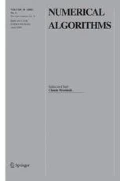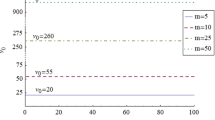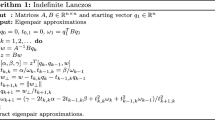Abstract
An adaptive Richardson iteration method is presented for the solution of large linear systems of equations with a sparse, symmetric, nonsingular, indefinite matrix. The relaxation parameters for Richardson iteration are chosen to be reciprocal values of Leja points for a compact setK:=[a,b]∪[c,d], where [a,b] is an interval on the negative real axis and [c, d] is an interval on the positive real axis. Endpoints of these intervals are determined adaptively by computing certain modified moments during the iterations. Computed examples show that this adaptive Richardson method can be competitive with the SYMMLQ and the conjugate residual methods, which are based on the Lanczos process.
Similar content being viewed by others
References
N. Achyeser, Über einige Funktionen, welche in zwei gegebenen Intervallen, am wenigsten von Null abweichen, Bull. Acad. Sci. URSS, VII Série 9 (1932) 1163–1202.
S.F. Ashby, T.A. Manteuffel and P.E. Saylor, A taxonomy for conjugate gradient methods, SIAM J. Numer. Anal. 27 (1990) 1542–1568.
C. de Boor and J.R. Rice, Extremal polynomials with application to Richardson iteration for indefinite linear systems, SIAM J. Sci. Stat. Comput. 3 (1982) 47–57.
C.F. Borges and W.B. Gragg, A parallel divide and conquer algorithm for the generalized real symmetric definite tridiagonal eigenproblem, in:Numerical Linear Algebra, eds. L. Reichel, A. Ruttan and R.S. Varga (de Gruyter, Berlin, 1993) pp. 11–29.
D. Calvetti and L. Reichel, Adaptive Richardson iteration based on Leja points, J. Comput. Appl. Math., to appear.
D. Calvetti, L. Reichel and Q. Zhang, Conjugate gradient algorithms for symmetric inconsistent linear systems, in:Proceedings of the Cornelius Lanczos International Centenary Conference, eds. J.D. Brown, M.T. Chu, D.C. Ellison and R.J. Plemmons (SIAM, Philadelphia, 1994) pp. 267–272.
G. Dahlquist, S. Eisenstat and G.H. Golub, Bounds for the error of linear systems of equations using the theory of moments, J. Math. Anal. Appl. 37 (1972) 151–166.
G. Dahlquist, G.H. Golub and S.G. Nash, Bounds for the error in linear systems, in:Semi-Infinite Programming, ed. R. Hettich, Lecture Notes in Control and Information Sciences #15 (Springer, Berlin, 1979), pp. 154–172.
J.J. Dongarra, I.S. Duff, D.C. Sorensen and H.A. van der Vorst,Solving Linear Systems on Vector and Shared Memory Computers (SIAM, Philadelphia, PA, 1991).
A. Edrei, Sur les déterminants récurrents et les singularités d'une fonction donnée par son développement de Taylor, Composito Math. 7 (1939) 20–88.
M. Eiermann, X. Li and R.S. Varga, On hybrid semi-iterative methods, SIAM J. Numer. Anal. 26 (1989) 152–168.
M. Eiermann, W. Niethammer and R.S. Varga, A study of semiiterative methods for nonsymmetric systems of linear equations, Numer. Math. 47 (1985) 505–533.
B. Fischer, Chebyshev polynomials for disjoint compact sets, Constr. Approx. 8 (1991) 309–329.
R. Freund, On polynomial preconditioning and asymptotic convergence factors for indefinite Hermitian matrices, Lin. Alg. Appl. 154–156 (1991) 259–288.
W. Gautschi, On generating orthogonal polynomials, SIAM J. Sci. Stat. Comput. 3 (1982) 289–317.
G.H. Golub, Some modified matrix eigenvalue problems, SIAM Rev. 15 (1973) 318–334.
G.H. Golub and M.D. Kent, Estimates of eigenvalues for iterative methods, Math. Comp. 53 (1989) 619–626.
G.H. Golub and C.F. Van Loan,Matrix Computations, 2nd ed. (Johns Hopkins University Press, Baltimore, MD, 1989).
G.H. Golub and J.H. Welsch, Calculation of Gauss quadrature rules, Math. Comput. 23 (1969) 221–230.
W.B. Gragg and L. Reichel, On the application of orthogonal polynomials to the iterative solution of linear systems of equations with indefinite or non-Hermitian matrices, Lin. Alg. Appl. 88–89 (1987) 349–371.
M. Gu and S.C. Eisenstat, A divide-and-conquer algorithm for the symmetric tridiagonal eigenproblem, SIAM J. Matrix Anal. Appl. 16 (1995) 172–191.
V.I. Lebedev, Iterative methods for solving operator equations with a spectrum contained in several intervals, USSR Comp. Math. Math. Phys. 9(6) (1969) 17–24.
F. Leja, Sur certaines suits liées aux ensemble plan et leur application à la representation conforme, Ann. Polon. Math. 4 (1957) 8–13.
R.B. Morgan, Computing interior eigenvalues of large matrices, Lin. Alg. Appl. 154–156 (1991) 289–309.
C.C. Paige and M.A. Saunders, Solution of sparse indefinite systems of linear equations, SIAM J. Numer. Anal. 12 (1975) 617–624.
C.C. Paige, B.N. Parlett and H.A. van der Vorst, Approximate solutions and eigenvalue bounds from Krylov subspaces, Numer. Lin. Alg. Appl., to appear.
L. Reichel, The application of Leja points to Richardson iteration and polynomial preconditioning, Lin. Alg. Appl. 154–156 (1991) 389–414.
R.R. Roloff, Iterative methods for matrix equations for symmetric matrices possessing positive and negative eigenvalues, Ph.D. thesis, Report UIUCDCS-R-79-1018, Department of Computer Science, University of Illinois at Urbana-Champaign, Urbana, IL (1979).
Y. Saad, Iterative solution of indefinite symmetric linear systems by methods using orthogonal polynomials over two disjoint intervals, SIAM J. Numer. Anal. 20 (1983) 784–811.
Y. Saad, Practical use of Krylov subspace methods for solving indefinite and nonsymmetric linear systems, SIAM J. Sci. Stat. Comput. 5 (1984) 203–228.
P.E. Saylor, Leapfrog variants of iterative methods for linear algebraic equations, J. Comput. Appl. Math. 24 (1988) 169–193.
H. Widom, Extremal polynomials associated with a system of curves in the complex plane, Adv. Math. 3 (1969) 127–232.
Author information
Authors and Affiliations
Additional information
Communicated by G.H. Golub
Dedicated to Germund Dahlquist on the occasion of his 70th birthday
Research supported in part by the Design and Manufacturing Institute at Stevens Institute of Technology.
Research supported in part by NSF grants DMS-9002884 and DMS-9205531.
Rights and permissions
About this article
Cite this article
Calvetti, D., Reichel, L. An adaptive Richardson iteration method for indefinite linear systems. Numer Algor 12, 125–149 (1996). https://doi.org/10.1007/BF02141745
Received:
Revised:
Issue Date:
DOI: https://doi.org/10.1007/BF02141745




